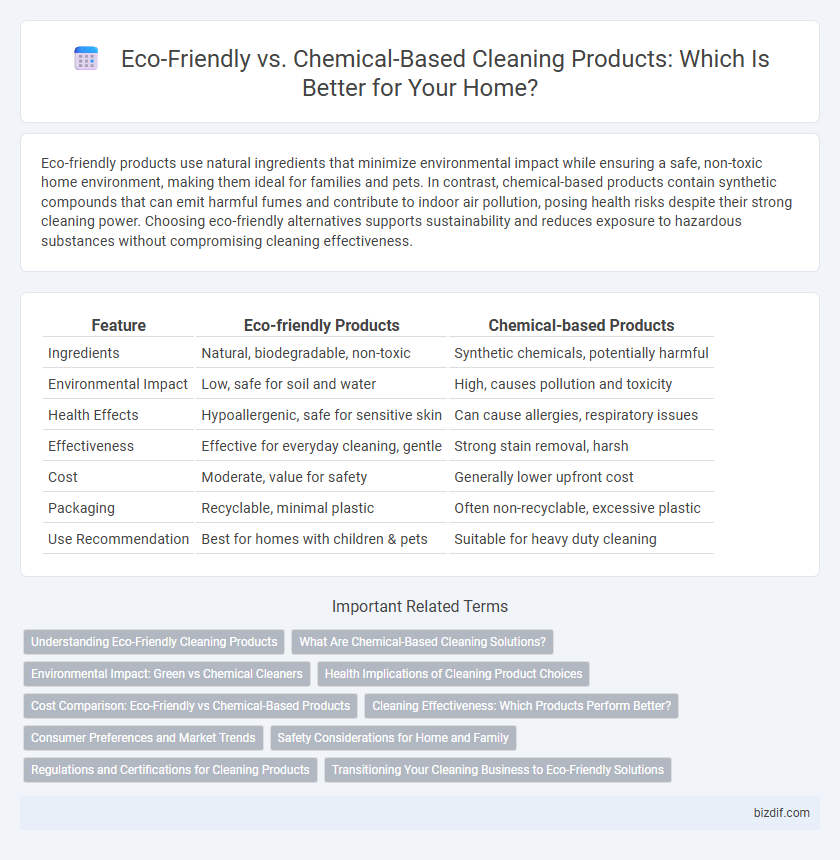Eco-friendly products use natural ingredients that minimize environmental impact while ensuring a safe, non-toxic home environment, making them ideal for families and pets. In contrast, chemical-based products contain synthetic compounds that can emit harmful fumes and contribute to indoor air pollution, posing health risks despite their strong cleaning power. Choosing eco-friendly alternatives supports sustainability and reduces exposure to hazardous substances without compromising cleaning effectiveness.
Table of Comparison
| Feature | Eco-friendly Products | Chemical-based Products |
|---|---|---|
| Ingredients | Natural, biodegradable, non-toxic | Synthetic chemicals, potentially harmful |
| Environmental Impact | Low, safe for soil and water | High, causes pollution and toxicity |
| Health Effects | Hypoallergenic, safe for sensitive skin | Can cause allergies, respiratory issues |
| Effectiveness | Effective for everyday cleaning, gentle | Strong stain removal, harsh |
| Cost | Moderate, value for safety | Generally lower upfront cost |
| Packaging | Recyclable, minimal plastic | Often non-recyclable, excessive plastic |
| Use Recommendation | Best for homes with children & pets | Suitable for heavy duty cleaning |
Understanding Eco-Friendly Cleaning Products
Eco-friendly cleaning products utilize natural ingredients such as plant-based oils, vinegar, and baking soda, minimizing environmental impact and reducing exposure to harmful chemicals. These products are biodegradable and free from synthetic fragrances, parabens, and phosphates, promoting healthier indoor air quality and safer use around children and pets. Compared to chemical-based cleaners, eco-friendly alternatives support sustainable practices while effectively removing dirt and grime without toxic residues.
What Are Chemical-Based Cleaning Solutions?
Chemical-based cleaning solutions contain synthetic compounds such as ammonia, bleach, and phosphates that effectively remove dirt, grease, and stains but may pose health risks and environmental hazards. These products often include volatile organic compounds (VOCs) that contribute to indoor air pollution and can cause respiratory issues. Despite their strong cleaning power, chemical-based cleaners require careful handling and disposal to minimize negative impacts on human health and ecosystems.
Environmental Impact: Green vs Chemical Cleaners
Eco-friendly home cleaning products significantly reduce environmental pollution by using biodegradable ingredients that minimize water and soil contamination compared to chemical-based cleaners. Chemical cleaners often contain harmful substances like ammonia and phosphates that persist in ecosystems, causing long-term damage to aquatic life and reducing biodiversity. Choosing green cleaning solutions supports sustainable practices by lowering toxic waste and carbon footprint while maintaining effective hygiene standards.
Health Implications of Cleaning Product Choices
Eco-friendly cleaning products reduce exposure to harmful chemicals such as ammonia, phthalates, and synthetic fragrances, lowering the risk of respiratory issues, skin irritations, and allergic reactions. Chemical-based products often contain volatile organic compounds (VOCs) that contribute to indoor air pollution and can exacerbate asthma and other chronic respiratory conditions. Choosing plant-based, biodegradable ingredients supports healthier indoor environments and minimizes long-term health risks for families and pets.
Cost Comparison: Eco-Friendly vs Chemical-Based Products
Eco-friendly cleaning products typically have a higher upfront cost compared to chemical-based alternatives but offer long-term savings through concentrated formulas and reduced health risks. Chemical-based products are often cheaper initially but may lead to increased expenses due to potential damage to surfaces and health-related issues. Considering biodegradability and safety, eco-friendly options provide a cost-efficient choice aligned with sustainable living goals.
Cleaning Effectiveness: Which Products Perform Better?
Eco-friendly cleaning products often utilize natural enzymes and plant-based ingredients that effectively break down dirt and grease without harsh residues, making them suitable for regular home use. Chemical-based products typically deliver faster and more intense cleaning results, especially on tough stains and high-germ areas, due to strong synthetic agents. Studies show that while chemical cleaners outperform in heavy-duty tasks, eco-friendly alternatives provide comparable cleaning effectiveness for everyday surfaces with the added benefit of reducing environmental impact.
Consumer Preferences and Market Trends
Consumer preferences increasingly favor eco-friendly products due to growing awareness of health and environmental impacts, driving market trends toward sustainable home cleaning solutions. Sales data highlight a steady rise in demand for biodegradable and non-toxic cleaning agents over traditional chemical-based products. Market analysis reveals that brands offering green certifications and transparent ingredient lists experience higher consumer trust and loyalty in the competitive home cleaning sector.
Safety Considerations for Home and Family
Eco-friendly cleaning products minimize exposure to toxic chemicals, reducing risks of respiratory issues, skin irritation, and allergic reactions for family members, especially children and pets. Chemical-based cleaners often contain harsh substances like ammonia and bleach, which can emit harmful fumes and pose ingestion hazards in a home environment. Prioritizing non-toxic, plant-based ingredients enhances indoor air quality and promotes a safer living space for all household members.
Regulations and Certifications for Cleaning Products
Eco-friendly cleaning products are often regulated under strict environmental standards such as the EPA's Safer Choice program and certified by labels like Green Seal or ECOLOGO, ensuring reduced toxicity and environmental impact. Chemical-based products must comply with Health Canada's Consumer Chemicals and Containers Regulations, which mandate safety testing and ingredient disclosure to protect human health and the environment. Certifications for eco-friendly products emphasize biodegradability, non-toxicity, and sustainable sourcing, while chemical-based products focus primarily on efficacy and safety limits for hazardous substances.
Transitioning Your Cleaning Business to Eco-Friendly Solutions
Transitioning your cleaning business to eco-friendly solutions reduces environmental impact by eliminating harmful chemicals commonly found in chemical-based products. Eco-friendly products leverage biodegradable ingredients and natural enzymes that ensure effective cleaning while promoting health safety for clients and employees. Adopting sustainable cleaning supplies enhances brand image and meets increasing consumer demand for green cleaning services.
Eco-friendly Products vs Chemical-based Products Infographic

 bizdif.com
bizdif.com